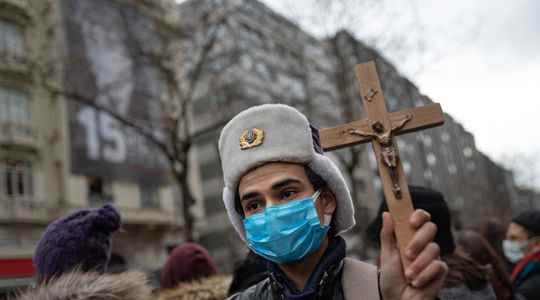On January 19, the district of Sisli, on the European side of Istanbul, is enveloped in snow. The cold did not prevent a dense crowd from gathering in front of the offices of the Armenian newspaper Agos. Here, exactly fifteen years ago, the Armenian journalist Hrant Dink fell under the bullets of a young Turkish ultranationalist. The trial of this assassination, which shocked the country, is still not closed.
In chorus, the hundreds of demonstrators proclaim: “Those who protect the assassins are accomplices in the murder!” All criticize the Turkish state for not doing what is necessary to identify the real sponsors of this murder which has awakened the ancestral wounds of the Armenians of Turkey, one hundred years after the genocide (more than a million dead from 1915 to 1923) . “This assassination produced the opposite of the expected effect. Since then, people who previously did not feel concerned are interested in the history of the Armenians and that of the genocide”, poses Masis Kürkçügil, activist and intellectual Armenian from Turkey.
But if the wounds of the Armenians remain open, diplomacy opens new promises: in Moscow, on January 14, the two countries began a first round of talks intended to normalize their relations.
The Armenian defeat in Nagorno-Karabakh, a trigger for diplomacy
This changeover takes place following the war in Nagorno-Karabakh, which saw Armenia and Azerbaijan clash from September to November 2020. As long as this territory was disputed, it was unthinkable for the Turks to discuss with the Armenians. “Azerbaijan’s victory in this conflict has solved one of the major problems that were blocking the resumption of diplomatic relations,” said Yildiz Deveci Bozkus, a professor at Ankara University. Azerbaijan’s military success is notably due to the armed drones provided by Turkey to its allies. “But the Turks, who had been promised an important role as a peacekeeping force on the ground, were left out of the process by Moscow,” said Richard Giragosian, founder of the Regional Studies Center think tank, based in in Yerevan, the Armenian capital.
However, it is under the leadership of Russia, Armenia’s historic sponsor, that the current negotiations with Turkey are taking place. “Russia wants to prevent Turkey from anchoring its influence too deeply in the Caucasus, but it supports the process to keep control, analyzes Yildiz Deveci Bozkus. The primary goal of the Russians is above all to put Westerners out of play in the region, and they succeeded.”
In addition, negotiations between Azeris and Armenians have already led to a preliminary agreement on the reopening of a former Soviet railway line which linked Baku and Yerevan, and could extend into northeastern Turkey.. For the Turkish government, the opening of a land route to Azerbaijan, via a possible reopening of its border with Armenia (closed since 1993), is of considerable interest: it would make it possible to connect Turkey directly to Central Asia, where many countries share its cultural and linguistic traits. The role of Ankara in the very strategic Chinese project of the “new silk roads” would also come out of it reinforced.
On the Armenian side, the negotiations are opening up essential economic prospects for this small landlocked country. This is the reason why the Prime Minister, Nikol Pashinian, did not set any prerequisite for recognition of the Armenian genocide by Turkey before starting this rapprochement. “Despite the military defeat against Azerbaijan, it won the June 2021 elections by a large margin and therefore enjoys strong legitimacy to conduct these negotiations”, analyzes Richard Giragosian.
Already in 2009, the two countries had signed a peace agreement, without ever ratifying it. This time the context is different. The attempt at normalization could be accompanied by sporting, academic or media events aimed at bringing together the two neighboring societies, yet separated by a bloodbath and two irreconcilable histories.
